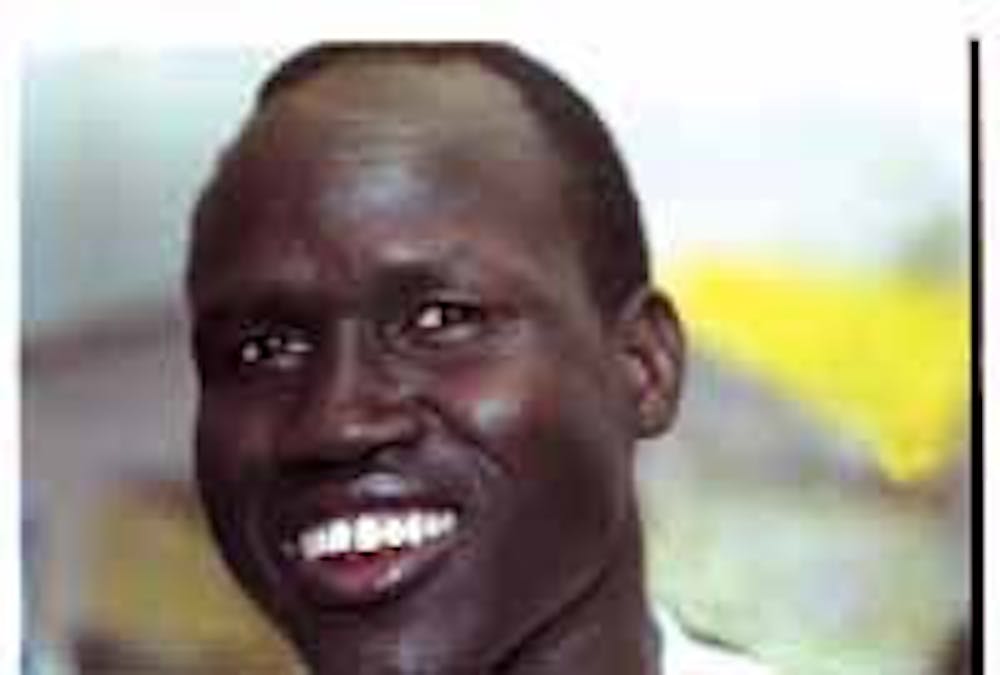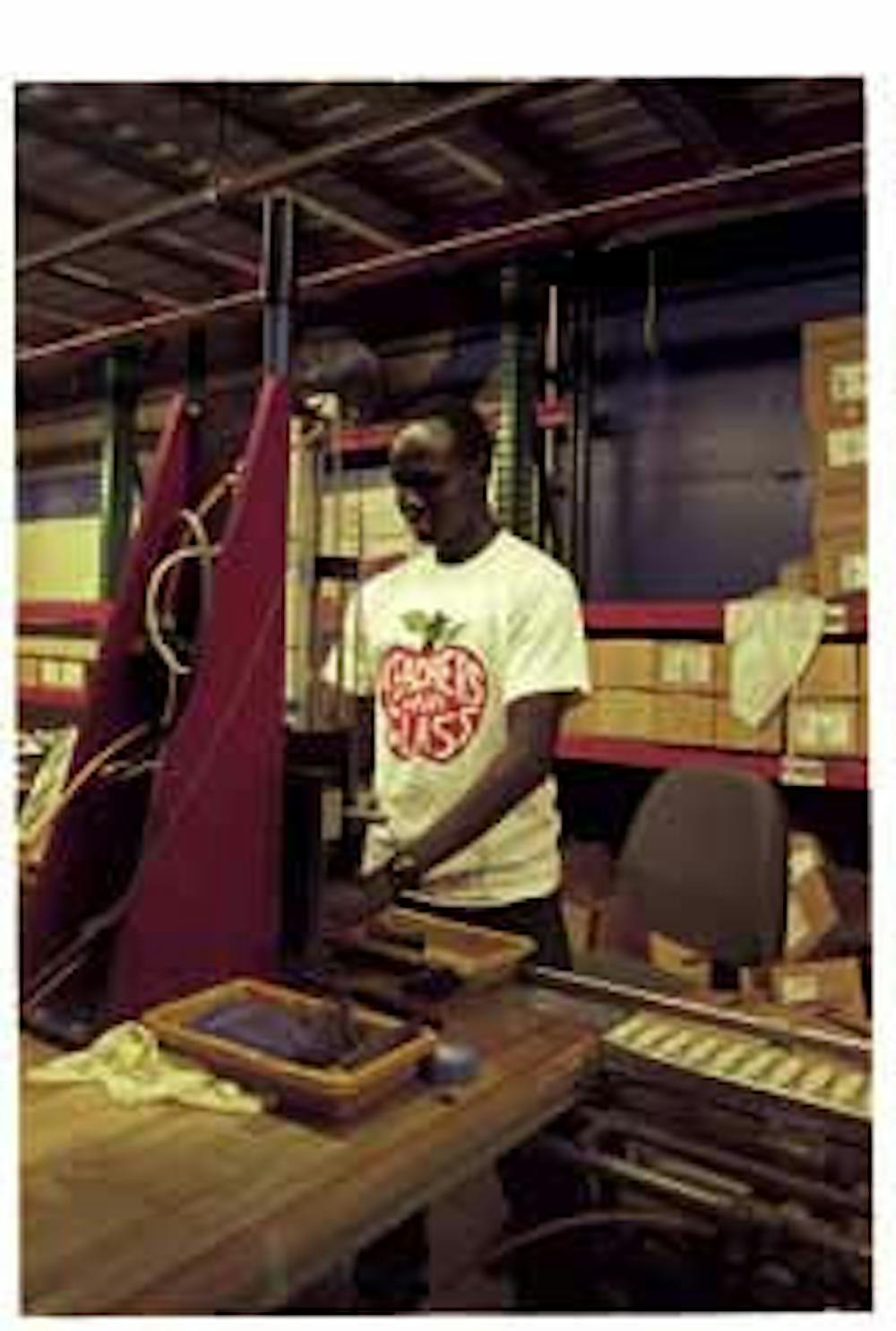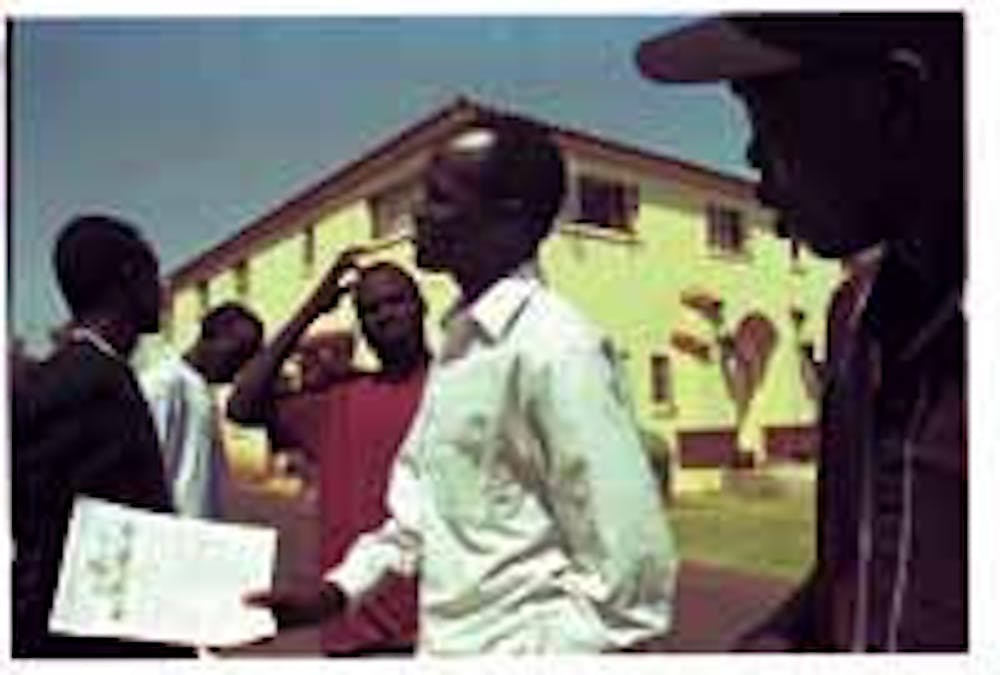Joseph Majaic Took hurried to join the other young African men gathering on the front lawn after Sunday morning mass ended at St. Gregory Catholic Church in Phoenix.
They told rapid-fire jokes in Dinka, their tribal language, with brotherly slaps on each other's backs. White smiles shined from their ebony faces.
Eight months ago, Joseph, 23, became one of nearly 200 Sudanese refugees who have moved to Phoenix recently to escape the civil war and famine that has plagued their country since 1983.
According to an April 2000 report by the United Nations, between 1.6 million and 1.9 million Sudanese have died since the beginning of the war.
The young men, who've spent their entire childhood running from war in eastern Africa, have been affectionately dubbed "The Lost Boys of Sudan" by the Phoenix interfaith community that has taken them in and is anxious to give them a fighting chance at the American dream.
Each year, Congress decides how many refugees can come to the United States, said Attila Magyar, coordinator of special refugee services for Catholic Social Services in Phoenix.
"This year, they will allow up to 70,000 refugees, and up to 22,000 of those can be from Africa," Magyar said. "It is up to American workers to verify if people are indeed persecuted or not — either politically, religiously or racially — and the government is the one that says 'We will accept you.'"
Joseph is one of approximately 3,800 Sudanese youth who have been allowed to resettle in the United States. They've moved to cities around the country and have been welcomed by various relief agencies.
Catholic Social Services, the largest resettling agency, took Joseph's case and decided to resettle him in Phoenix, one of 103 Catholic Social Services resettling locations.
It has been a long journey for Joseph.
As an 8-year-old, Joseph was looking after his family's cattle in a pasture near his mud and grass hut in southern Sudan on a hot day in 1986. He had no idea that by the end of the day he would run from armed rebels, witness the shooting and killing of his father and flee from his home and family without a chance to look back.
The Islamic rebels came from northern Sudan, where the Muslim government had already spent the past three years orchestrating an armed campaign to enforce Islamic law throughout the nation.
"The rebels came out and just started shooting people; they would shoot anybody," Joseph recalled. "People were running, but they were being killed, so I ran by myself."
It was then that Joseph turned around to see his father lying on the ground.
"I saw my father, and he does not wake up anymore. They killed and shot my father."
But soldiers with guns were still on Joseph's trail, anxious to take him alive.
"They wanted to kidnap me and take me to Khartoum (Sudan's capital) with them. Then they would sell me to people to make me work for them and make me be Islamic," he said. "That is slavery."
But the young boy was able to clear a fence, and the rebels gave up chase.
Joseph was on his own until he met other children who were also on the run.
"When war broke out, we just ran for nowhere," he said. "We didn't know where we were going."
With nothing to carry but the tattered clothes on his back, Joseph joined about 500 other children and a handful of men and women and spent the next four months trekking across the African desert toward Ethiopia in search of refuge.
"We had to look for food and water along the way," he said. "We walked at night because of the cold pressure, so we would not feel so thirsty."
The travelers found an occasional goat or cow to eat along the way, but they ate leaves and grass more often than not.
"Some people spent three days without food, and some can't get any food," he said.
Joseph estimated that a total of 200 to 300 people died during the trek.
"There were very many in the beginning, but so many people died along the way," he said. "If your brother falls down, you can't carry him. If you fall, you remain like that. It is very sad but we had no way to solve it."
The war chased Joseph and thousands of other refugees from camp to camp, from Ethiopia to Sudan to Kenya. For the next 14 years, Joseph would grow from a boy into a man.
The walls of the Phoenix Central Library shook and the floors vibrated as the roomful of Lost Boys stomped their feet and raised their voices during a native dance performance.
The audience's clapping accompanied the beating of several African drums.
The dance was part of the first celebration of Sudanese Refugee Day, which had been officially declared by Arizona Gov. Jane Hull.
People from Phoenix's Lutheran Social Services, International Rescue Committee and Catholic Social Services were there to show their commitment to be part of the lives of the Lost Boys they sponsor and mentor.
This local interfaith community has taken upon itself the young men's suffering.
"They have trained me so many times and given me so much," Joseph said.
When Joseph was baptized in the Catholic Church in Kenya in 1994, he found a new lease on life that he knew would sustain him physically and spiritually.
He had been living in a refugee camp called Kakuma, which was established in 1992 by the U.N. High Commissioner for Refugees for about 12,000 Sudanese between the ages of 7 and 16.
Catholicism had a strong presence in Kenya, and Joseph became involved in the Holy Cross church community within the camp.
"It is my faith," he said. "I don't abandon it."
Finding the right church in Phoenix was important to Joseph when he first arrived, and he found St. Gregory Church by word of mouth.
"It is a Holy Cross Parish church, just like the one I was trained in in Kenya," he said. "I am used to that church."
At St. Gregory, a predominately white and Hispanic church in central Phoenix, there was no way the group of African men would go unnoticed.
Joseph and about 25 other Lost Boys attend the church regularly and have consequently touched the church community in small, but visible, ways.
"A lot of people at the beginning were distant toward them," said Kathy Muñoz, a church member. "But now they're more welcoming. They got to know the boys better through activities and by seeing the boys there on a regular basis."
The Lost Boys also formed an African choir, which is occasionally led by Joseph, "the choirmaster," and accompanied by his rhythms from native drums. They perform about once a month during mass.
"Joseph is kind of quiet and very polite," Muñoz said. "But he's full of little surprises. He's very private."
Muñoz has been driving Joseph and his roommate to mass since October, when she learned they were walking to church.
Since then, she has become somewhat of a mentor to a few of the young men, who all need a little guidance once in awhile, she said.
"There has been a lot of growth in Joseph by learning the new customs and finding his way around such a large city as Phoenix," she said. "I admire how much he's already accomplished."
And it is clear on Joseph's face as well.
His eyes are wise with pain and suffering. But a light behind them and something in his smile tell a different story.
The alarm on Joseph's watch comes to life at 5 a.m. every morning, forcing the long and lanky man out of bed while his two other roommates still snore in the small, dim bedroom.
It is dark outside as he quietly waits for his ride, a non-English-speaking Cuban woman with whom he works and pays $10 each week for gas.
"We can't talk to each other; we use our hands to understand each other," Joseph said, laughing.
For the next 10 hours, Joseph will man his usual station on an assembly line at Dial Manufacturing, where he uses a machine to press electric motor parts for swamp cooler pumps.
It is a monotonous and fast-paced job, requiring dexterous fingers and unassuming patience.
Dial Manufacturing, 25 S. 51st Ave., produces swamp cooler parts used around the world. The Phoenix-based company hired Joseph through Catholic Social Services, where it often looks for potential employees who need work, assembly supervisor Bob Dunn said.
"He's real eager to please," Dunn said of Joseph. "He doesn't require any supervision. I don't have to worry about him."
Magyar said Catholic Social Services usually has no trouble finding work for the young refugees.
"The Lost Boys have been good at accepting any kind of work available to them," Magyar said. "They are young, usually healthy, single, English speaking males," he said. "They have major advantages over other refugees in the U.S."
The assembly line is a working environment where Joseph doesn't feel so out of place — he is joined by Thai, Russian, Bosnian, Vietnamese, Mexican and Afghan co-workers who are trying their best to fit into a new society as well.
"I like the different people here," Joseph said. "Even when we don't understand each other, we can join in and laugh together."
Joseph says he enjoys his work, but training on the assembly machine took longer than his supervisor had expected.
"The machine was very hard for me at the beginning," Joseph said.
Dunn called Joseph an eager learner instead of a fast learner.
"He wants to do a good job. He works hard."
And he knows how to let go the African way — through dance.
When Joseph first started working in November, he came with three other Sudanese men.
"They were always wanting to dance," Dunn recalled. "They danced for us a few times and wanted us to videotape them dancing. Those guys were always really happy and fun to be around."
The men eventually got jobs at other places, making Joseph the lone Sudanese for the time being.
"Since then, he's gotten a lot calmer and quieter."
The $6 per hour Joseph earns pays for his crowded two-bedroom apartment and food, but little else.
He and his four roommates sit on donated couches that are beat up and don't match. They ride donated bicycles and use a donated Macintosh from the '80s.
The dimly lit apartment smells of exotic food and old furniture, and their bicycles are obtrusively piled in the small living room to keep from being stolen in the run-down neighborhood.
But they aren't losing sleep over it.
"In Kenya, we lived in grass houses," Joseph recalled. "If you wanted a bed, you had to buy a dry tree and construct one. If you don't have money to buy a dry tree, you just have to lie there (on the floor)."
In another refugee camp in Ethiopia where he lived for four years, he slept on the ground and was happy to have a tree overhead if it rained.
Televisions, telephones, private bathrooms and electricity are now luxuries.
"This is all very different than what I am used to," he said as he looked around his bedroom. "This is much better."
But he hasn't exactly developed the taste for American food, television and music. Channel 8 is the only TV station Joseph and his roommates watch, preferring shows about economics, politics, world news and nature.
And in his eight months here, he has never been to, nor heard of, McDonald's.
"I cook mostly meat, chicken and rice," he said. "I don't go out to restaurants."
One thing Joseph can't get enough of is the American dream.
"I want to become a doctor someday," he said with conviction. "I want to understand the sciences and medicine."
Joseph hopes to begin biology class this fall at Phoenix College, but for now he is completing his first semester of ESL class there.
He spends four nights a week there after his 10-hour workday, and he spends another hour at home doing homework and studying each night.
The English classes Joseph took while growing up in refugee camps have helped, but he still struggles with the language.
"English has been hard for me," he said.
But there is no way he will give up. His sights are set on attending UA to study the sciences and eventually become a doctor.
"I like the sciences and I want to help people," he said. "I would like to work in Africa sometime, but come back to the U.S. I don't feel like much improvement can be done to things here in America — everything is already good. But Africa needs much improvement."
Joseph recites a prayer faithfully each day, and he said he'll continue to say it the rest of his life:
"Thank you Lord. Bless me and open my brain for wisdom and open my heart for faith. Bless my country to be in peace. Forgive me what I commit wrong. Bless the children from Sudan, that we can live in unity and peace. Amen."
Reach the reporter at kristina.davis@asu.edu.







